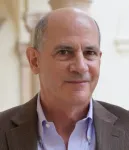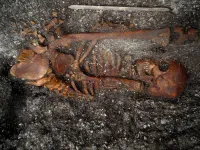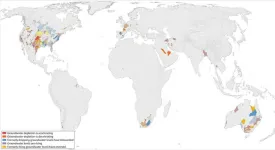The American Federation for Aging Research (AFAR), a national, nonprofit whose mission is to advance and support healthy aging through biomedical research, is pleased to announce the election of Thomas A. Rando, MD, PhD, as President of the Board of Directors in December 2023.
Dr. Rando is currently the Director of the Eli and Edythe Broad Center of Regenerative Medicine and Stem Cell Biology at UCLA, where he is a professor of Neurology and Molecular, Cell, and Developmental Biology. Previously, he was faculty in Department of Neurology and Neurological Sciences at Stanford University, where he was the founding director of the Glenn Center for the Biology of Aging, chief of neurology at the Palo Alto VA Medical Center, and Deputy Director of the Stanford Center on Longevity. He was also the Program Director for an NIA-funded training program in aging research for graduate students and postdoctoral fellows at Stanford.
Having published over 200 peer-reviewed journals, Dr. Rando’s interests focus on the role of stem cells in tissue maintenance and repair, and how changes in stem cell function result in a declining ability of tissues to regenerate in response to injury or disease with age. Research from his laboratory has been at the forefront of the field of “epigenetic rejuvenation”, beginning with studies showing that exposure to factors in young blood renders aged cells and tissues more youthful. His research has given rise to novel clinical trials for age-related diseases and multiple biotechnology companies, and he serves on the boards of several biotechnology companies and on the editorial boards of numerous scientific journals.
"Thomas Rando has led research that undoubtedly has laid the foundation for understanding the biology of aging and translating this into potential therapeutics," notes Stephanie Lederman, EdM, AFAR Executive Director. "AFAR is not only proud to have provided him an early career grant to support his far-reaching research path but also grateful for his contributions to the organization as a board member. He will excel in this new role as President to help guide AFAR's vision for aging research at large and healthy aging for all."
Globally, Dr. Rando has been recognized as Honorary Professor of the Chinese Academy of Medical Sciences, an Honorary Skou Professor at Aarhus University in Denmark, and a Senior Visiting Fellow in the Institute for Advanced Study at the Hong Kong Institute of Science and Technology.
In the U.S., the National Institutes of Health (NIH) have recognized Dr. Rando with the NIH Director’s Pioneer Award, and an NIH Director’s Transformative Research Award, and he has been a member of the National Advisory Council on Aging of the National Institutes of Health. He has received the most prestigious recognitions in the sciences, including election to the American Academy of Neurology, the American Association for the Advancement of Sciences, the American Academy of Arts and Sciences, and the National Academy of Medicine.
Notably, Dr. Rando received early career support from AFAR through a 1999 Paul Beeson Physician Faculty Scholar Award. In 2008, he received AFAR's Glenn Foundation Breakthroughs in Gerontology (BIG) Award.
"I am deeply honored to serve AFAR as President of its Board of Directors. I have witnessed this board's commitment to AFAR's unparalleled dedication to moving forward research that will help us all live healthier, longer," notes Rando. "As an AFAR grantee myself, I know the impact of such support, and I have watched the field blossom thanks to ideas and individuals that AFAR has championed. Aging research is truly on the precipice of discoveries and therapeutics that will transform how we thrive as we age, and I am energized to help AFAR lead this promising future as its President."
He joined the AFAR Board of Directors in 2017 and was elected President-Elect in January 2021. During this time, he has served on various board committees including the Scientific Review, TAME Advisory, Strategic Development, and Governance/Board Development committees, as well as the Executive Committee. He has chaired the Selection Committee for AFAR’s Glenn Foundation for Medical Research Postdoctoral Fellowship Program in Aging, and has served on AFAR’s National Scientific Advisory Council.
Starting January 2024, Dr. Rando joins an impressive roster of past Presidents including (in chronological order): Irving S. Wright, Carl Eisdorfer, John W. Rowe, Marc E. Weksler, John P. Blass, Vincent Cristofalo, R. Knight Steel, George M. Martin, Christine K. Cassel, Mark H. Beers, Terrie Fox Wetle, Roger J. McCarter, Harvey Jay Cohen, Mark Lachs, and James L. Kirkland.
View AFAR's current Board of Directors here.
###
About AFAR
The American Federation for Aging Research (AFAR) is a national non-profit organization that supports and advances pioneering biomedical research that is revolutionizing how we live healthier and longer. For more than four decades, AFAR has served as the field’s talent incubator, providing nearly $200 million to some 4,400 investigators at premier research institutions to date—and growing. In 2023, AFAR expects to provide approximately $12,500,000 to more than 60 investigators. A trusted leader and strategist, AFAR also works with public and private funders to steer high quality grant programs and interdisciplinary research networks. AFAR-funded researchers are finding that modifying basic cellular processes can delay—or even prevent—many chronic diseases, often at the same time. They are discovering that it is never too late—or too early—to improve health. The science funded by AFAR is paving the way for innovative new therapies that promise to improve and extend our quality of life—at any age. Learn more at www.afar.org.
END


